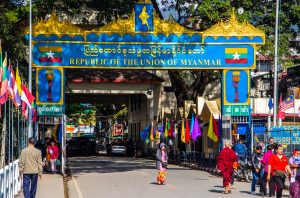Thailand’s former Prime Minister Thaksin Shinawatra has met with representatives of several groups fighting Myanmar’s military junta, in a bid to help mediate the conflict that has raged in the country since the 2021 coup.
According to a May 6 report from Myanmar’s Salween News, Thaksin has met representatives from the National Unity Government (NUG), which is coordinating the national struggle against the military junta, as well as figures from the Karen National Union, Restoration Council of Shan State, Karenni National Progressive Party, and Kachin National Organization.
Voice of America (VOA)’s Burmese Service subsequently reported that the informal meetings took place during Thaksin’s visits to his hometown of Chiang Mai in northern Thailand in March and April. Due to its proximity to the Myanmar border, Chiang Mai has long been a hub of exile political activities.
Thaksin, who returned to Thailand from a long period of exile last year and in February slipped out of an eight-year prison sentence for abuse of power dating from his time in power, has wasted no time in reoccupying an influential position in the Pheu Thai government led by Prime Minister Srettha Thavisin.
According to an anonymous source quoted by VOA, Thaksin expressed a desire to mediate between the junta and the panoply of groups opposing its rule. Thaksin has reportedly requested permission to visit Myanmar, though there has been no official response from the military council in Naypyidaw so far.
The news comes at a time when Thailand’s Foreign Ministry is hemorrhaging important personnel. Late last month, Foreign Minister Parnpree Bahiddha-Nukara, who had vowed to play a more active role in addressing the conflict in Myanmar, resigned in a fit of pique, after he was jilted in a cabinet reshuffle that also saw one of his deputies, Jakkapong Sangmanee, reassigned to another ministry. Since then, the other deputy foreign minister, Sihasak Phuangketkeo, also announced his resignation this week.
Thailand’s new Foreign Minister Sangiampongsa, a longtime associate of Thaksin who took up his post last week, yesterday confirmed Thaksin’s meetings but emphasized that the talks were, “at a personal level and not part of the Thai government’s policy towards its neighbor.” But, he added, “We have to admit that Mr Thaksin is well-known and has connections. Myanmar [i.e. the military junta] believes that he can help.”
Also yesterday, Prime Minister Srettha disavowed any knowledge about Thaksin’s meetings. “I don’t know whether there were such talks. But I believe that everybody harbors good intention for the country,” he said.
The Myanmar armed forces have good reason to think that they will find an understanding interlocutor in Thaksin. Following his election in 2001, Thaksin presided over a marked improvement in the relations between Thailand and military-ruled Myanmar, which were then fraying over border disputes and the flood of narcotics over the border into northern Thailand. In June 2001, shortly after his election, he undertook what CNN described at the time as a “bridge-building visit” to Myanmar, becoming the first sitting Thai prime minister to visit the country. According to the scholar Pavin Chachavalpongpun, Thaksin’s years in power marked a “golden period” in Thailand-Myanmar relations.
Another scholar observed that Thaksin’s policy toward the country, like his approach to foreign policy writ large, was “business-oriented,” and “placed priority on good relations with the junta rather than human rights and democracy.” As his foreign minister, Surakiart Sathirathai, put it at the time, “We would like to promote democracy in Burma, but we would like to do it the Asian way.”
Whether Thaksin has the intention of pursuing a similar approach now remains unclear. While both Foreign Minister Maris and Prime Minister Srettha have emphasized that Thaksin’s meetings were personal in nature, his influence and proximity to government make him a potentially useful conduit for unofficial talks between Thailand and parties to Myanmar’s conflict – assuming he is not already acting in this capacity. Because he holds no official position in government, he has the flexibility to engage with all parties to the country’s conflict without being restricted by the ASEAN norm of “non-interference.” This is reflected in the fact that Thaksin was able to meet with the NUG and key ethnic armed groups before representatives of the military junta, something that ASEAN’s governments, including Thailand, have been reluctant to do.
That said, the potential for a negotiated settlement remains very slim in Myanmar, where the military junta and its opponents are engaged in a conflict that they view as existential and zero-sum. In this context, there is probably little that can be done beyond keeping the channels of communication open until the moment when, or if, the two sides are amenable to talks.

































